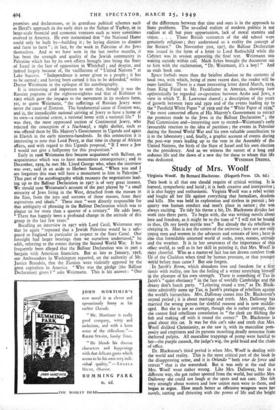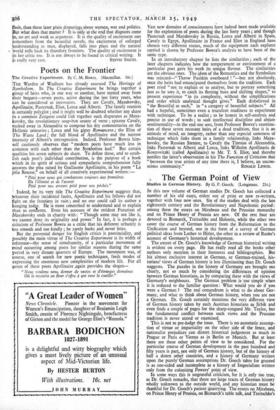Study of Mrs. Woolf
Vliginia Woolf. By Bernard Blackstone. (Hogarth Press. 12s. 6d.)
This book is all that one should require of critical writing. hill learned, sympathetic and lucid ; it is both creative and interpretive '; it is also happy and enthusiastic. Virginia Woolf was a rebel writer and fought all her life against everything that formalises, deadens and kills. She was bold in exploration and 'tireless in pursuit ; her quarry was human conduct and man's place in nature ; she was always exciting. To tidy his theme a bit, Dr. Blackstone divides het work into three parts. To begin with, she was writing novels about lOve and freedom, as it might be to the tune of " I will not be bound to; thee, Oh my lovely myrtle tree." But already the sly rebellion- IS creeping in. Man is not the centre of the universe ; here are not only ynting men and women in the advances and retreats of- love ; here. ii allsii) that formidable untamed world of rocks, trees, oceans, animals and the weather. It is in her awareness of the importance of tittle other world, as well as in her skill in painting it, that Mrs. Woolfli rndst cheerful. Who as a matter-of fact has not drawn comfort frog lir:of the Chaldees when tired by human pressure, or that younger vkirld before man came ? But one forgets.
ifn Jacob's Room, which abandons love and freedom for a firSt tussle with reality, one has the feeling of a writer stretching him
in the pleasure of his own strength. There is something. of Tao. racob's "quiet obstinacy " in the face of worldly Cambridge and the dreary don's lunch party. " Loitering round a tree," as Dr. Blaati- stone admirably sums up Tao, is Jacob's pratique of rebellion againat the world's hierarchies. Mrs. Dalloway comes into Dr. Blackstone% second period ; it is about marriage and truth. Mrs. Dalloway his married the wrong person for slothful reasons and is now middle.- aged. But she is not so corrupt, though she is rather corrupt, that she cannot find rebellious consolation in " the sleek cat filching iti6 fish and making off with it round the corner." Dr. Blackstone is good about this cat. It was for this cat's sake and truth that Mrs. Woolf disliked Christianity, as she saw it, with its masculine pom- posity and emptiness and its parsons mouthing deadly nonsense from sheltered pulpits. All masculine trappings of pomp were hateful- to her—the purple cassock, the judge's wig, the gold braid and the chain of 'office.
Dr. Blackstone's third period is when Mrs. Woolf is dealing with the world and reality. This is the most critical part of the book-in the disapproving sense, and it is Orlando " both tour de force and retreat " that is the watershed. But it was only at the end that Mrs. Woolf went rather wrong. Like Mrs. Dalloway, but in a different way, she got rather spotted from the world, but unlike Mrs. Dalloway she could not laugh at the spots and not care. She felt very strongly about women and how unjust men were to them, and began to argue. How much better as offensive weapons were her novels, cutting and thrusting with the power of life and:the bright ash, than these later plain disputiogs.about womei war and politics. t what does that matter 4 -His at-the end that disputes come in, no art and weak as argument. It is the quality of excitement one !remembers from the beautiful novels, the excitement of enlarged Understanding as man, displayed, falls into place and the natural :world rolls back its thundery frontiers. The quality of excitement is ;in her critic too. It is not always to be found in critical writing. It















































 Previous page
Previous page